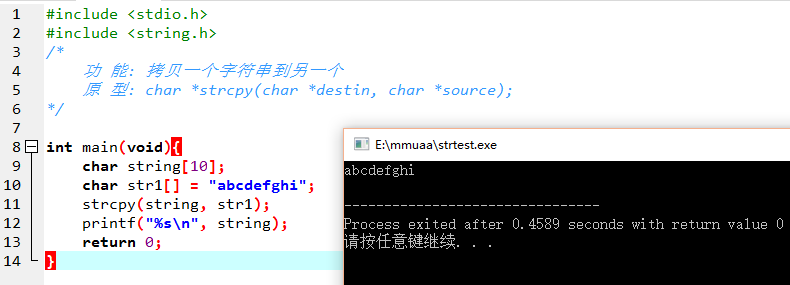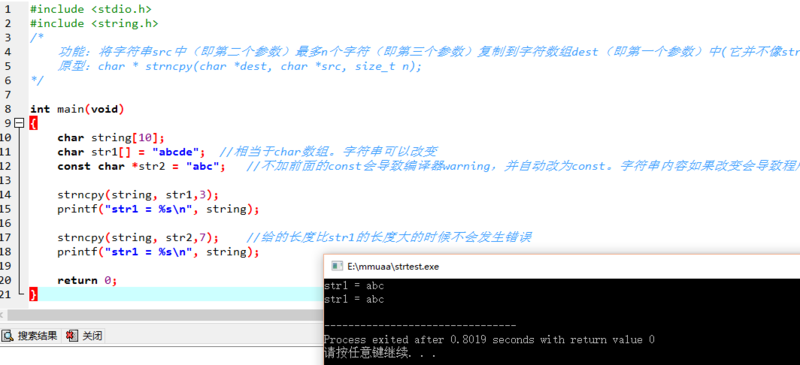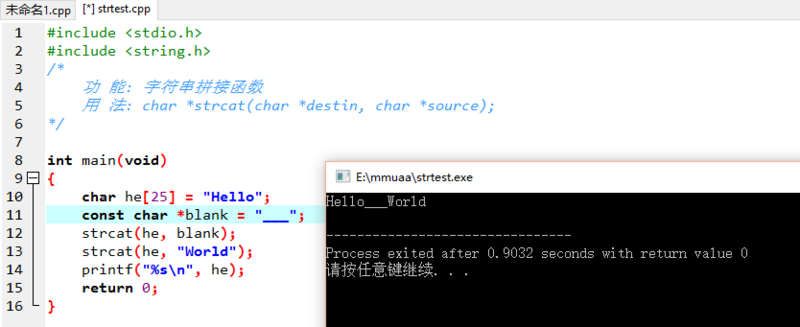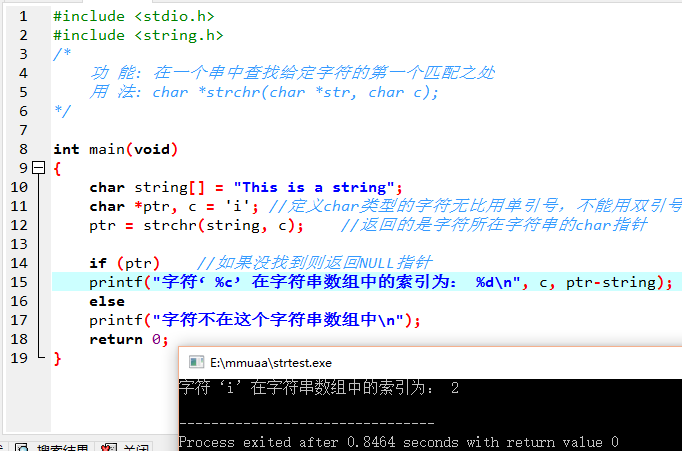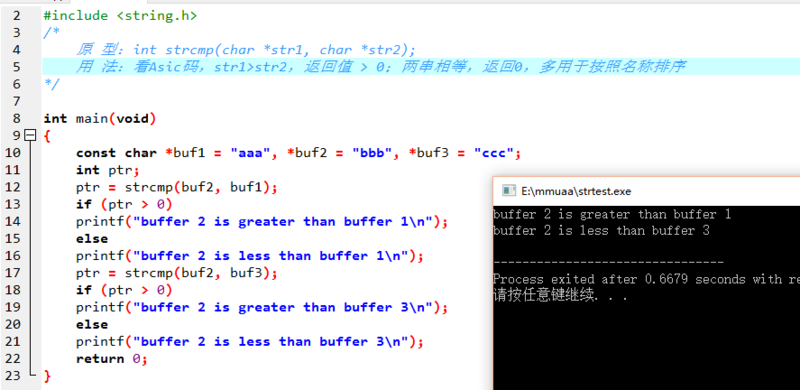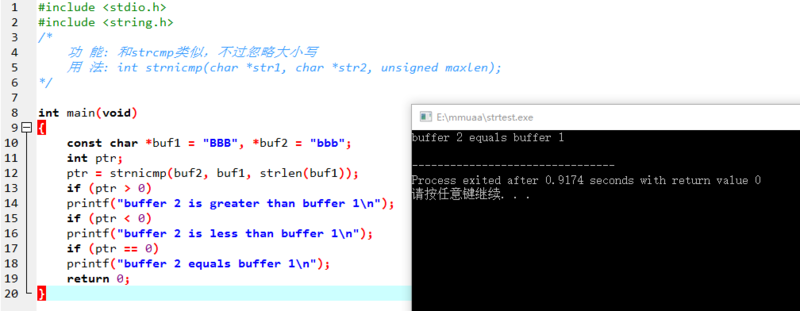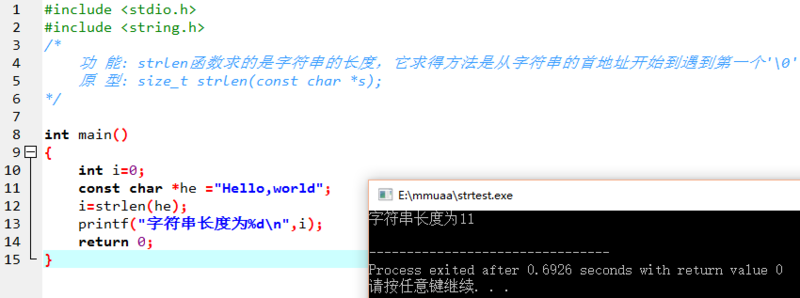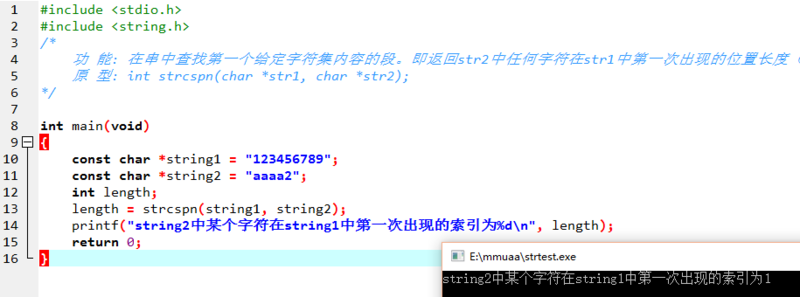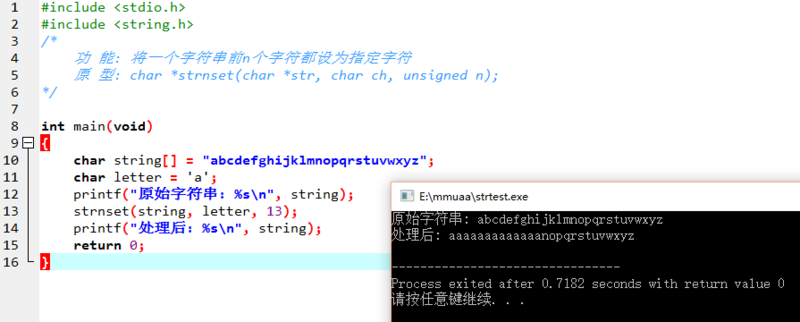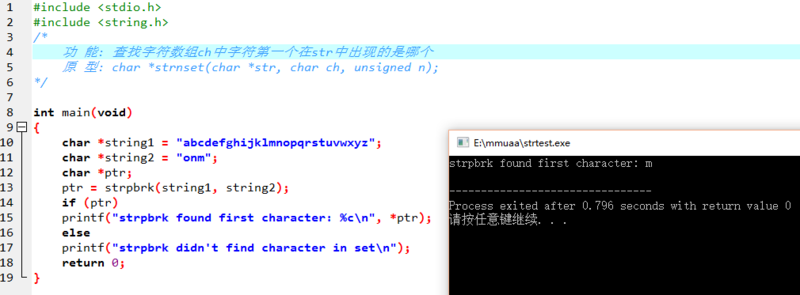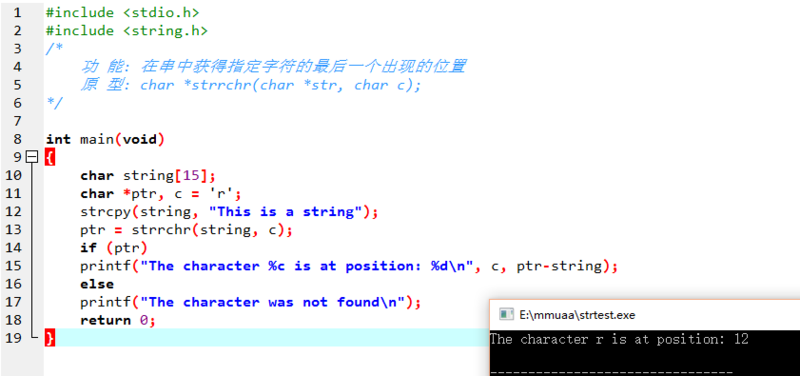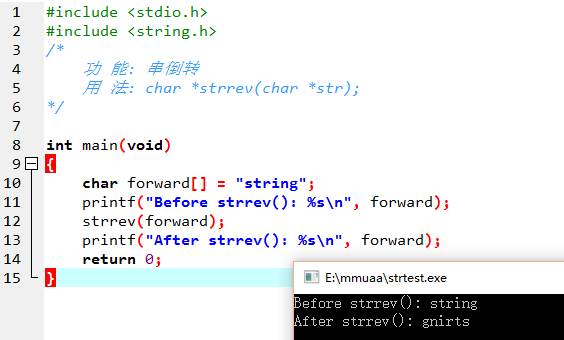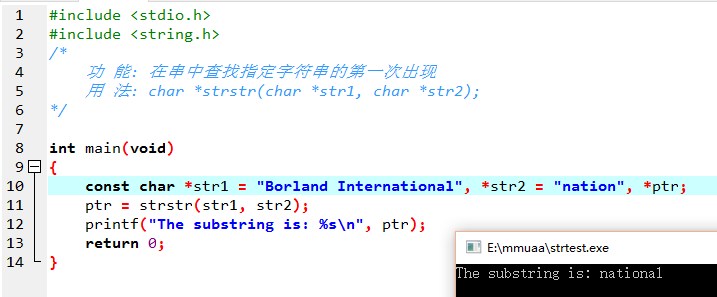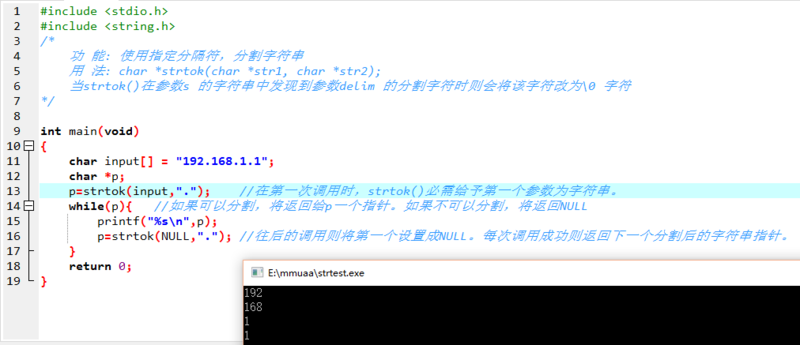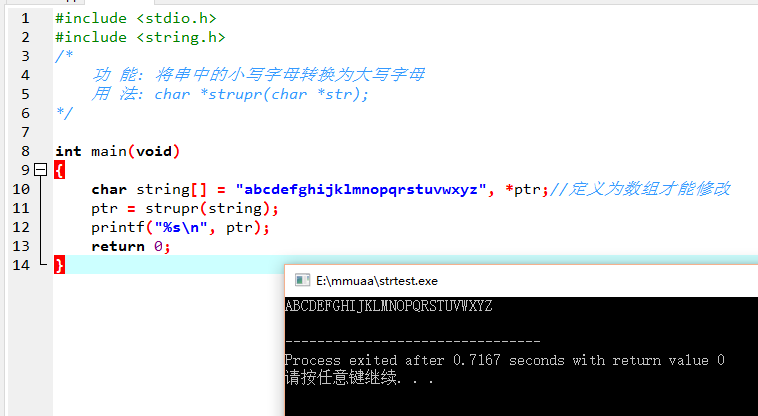C语言给我们提供了方便操作字符数组的函数,include文件即可使用下面的函数:
#include <string.h>0x00、字符串拷贝(strcpy)
#include <stdio.h>
#include <string.h>
/*
功 能: 拷贝一个字符串到另一个
原 型: char *strcpy(char *destin, char *source);
*/
int main(void){
char string[10];
char str1[] = "abcdefghi";
strcpy(string, str1);
printf("%s\n", string);
return 0;
}0x01、字符串拷贝n个字符(strncpy)
#include <stdio.h>
#include <string.h>
/*
功能:将字符串src中(即第二个参数)最多n个字符(即第三个参数)复制到字符数组dest(即第一个参数)中(它并不像strcpy一样遇到NULL才停止复制,而是等凑够n个字符才开始复制),返回指向dest的指针。
原型:char * strncpy(char *dest, char *src, size_t n);
*/
int main(void)
{
char string[10];
char str1[] = "abcde"; //相当于char数组。字符串可以改变
const char *str2 = "abc"; //不加前面的const会导致编译器warning,并自动改为const。字符串内容如果改变会导致程序崩溃
strncpy(string, str1,3);
printf("str1 = %s\n", string);
strncpy(string, str2,7); //给的长度比str1的长度大的时候不会发生错误
printf("str1 = %s\n", string);
return 0;
}0x02、拼接字符串(strcat)
#include <stdio.h>
#include <string.h>
/*
功 能: 字符串拼接函数
用 法: char *strcat(char *destin, char *source);
*/
int main(void)
{
char he[25] = "Hello";
const char *blank = "___";
strcat(he, blank);
strcat(he, "World");
printf("%s\n", he);
return 0;
}0x03、搜索字符串(strchr)
#include <stdio.h>
#include <string.h>
/*
功 能: 在一个串中查找给定字符的第一个匹配之处
用 法: char *strchr(char *str, char c);
*/
int main(void)
{
char string[] = "This is a string";
char *ptr, c = 'i'; //定义char类型的字符无比用单引号,不能用双引号
ptr = strchr(string, c); //返回的是字符所在字符串的char指针
if (ptr) //如果没找到则返回NULL指针
printf("字符‘%c’在字符串数组中的索引为: %d\n", c, ptr-string); //ptr-string就是索引位置
else
printf("字符不在这个字符串数组中\n");
return 0;
}0x04、比较字符串大小(strcmp)
#include <stdio.h>
#include <string.h>
/*
原 型:int strcmp(char *str1, char *str2);
用 法:看Asic码,str1>str2,返回值 > 0;两串相等,返回0,多用于按照名称排序
*/
int main(void)
{
const char *buf1 = "aaa", *buf2 = "bbb", *buf3 = "ccc";
int ptr;
ptr = strcmp(buf2, buf1);
if (ptr > 0)
printf("buffer 2 is greater than buffer 1\n");
else
printf("buffer 2 is less than buffer 1\n");
ptr = strcmp(buf2, buf3);
if (ptr > 0)
printf("buffer 2 is greater than buffer 3\n");
else
printf("buffer 2 is less than buffer 3\n");
return 0;
}0x05、比较字符串大小,不分大小写(strnicmp)
#include <stdio.h>
#include <string.h>
/*
功 能: 和strcmp类似,不过忽略大小写
用 法: int strnicmp(char *str1, char *str2, unsigned maxlen);
*/
int main(void)
{
const char *buf1 = "BBB", *buf2 = "bbb";
int ptr;
ptr = strnicmp(buf2, buf1, strlen(buf1));
if (ptr > 0)
printf("buffer 2 is greater than buffer 1\n");
if (ptr < 0)
printf("buffer 2 is less than buffer 1\n");
if (ptr == 0)
printf("buffer 2 equals buffer 1\n");
return 0;
}0x06、求字符串长度
#include <stdio.h>
#include <string.h>
/*
功 能: strlen函数求的是字符串的长度,它求得方法是从字符串的首地址开始到遇到第一个'\0'停止计数,如果你只定义没有给它赋初值,这个结果是不定的,它会从字符串首地址一直记下去,直到遇到'\0'才会停止。
原 型: size_t strlen(const char *s);
*/
int main()
{
int i=0;
const char *he ="Hello,world";
i=strlen(he);
printf("字符串长度为%d\n",i);
return 0;
}0x07、字符串查找另一个字符串中某个字符第一次出现的位置(strcspn)
#include <stdio.h>
#include <string.h>
/*
功 能: 在串中查找第一个给定字符集内容的段。即返回str2中任何字符在str1中第一次出现的位置长度(或索引)
原 型: int strcspn(char *str1, char *str2);
*/
int main(void)
{
const char *string1 = "123456789";
const char *string2 = "aaaa2";
int length;
length = strcspn(string1, string2);
printf("string2中某个字符在string1中第一次出现的索引为%d\n", length);
return 0;
}0x08、将字符串前几位设置成相同的字符(strnset)
#include <stdio.h>
#include <string.h>
/*
功 能: 将一个字符串前n个字符都设为指定字符
原 型: char *strnset(char *str, char ch, unsigned n);
*/
int main(void)
{
char string[] = "abcdefghijklmnopqrstuvwxyz";
char letter = 'a';
printf("原始字符串: %s\n", string);
strnset(string, letter, 13);
printf("处理后: %s\n", string);
return 0;
}0x09、字符集中查找第一个在字符串中出现的字符(strpbrk)
#include <stdio.h>
#include <string.h>
/*
功 能: 查找字符数组ch中字符第一个在str中出现的是哪个
原 型: char *strnset(char *str, char ch, unsigned n);
*/
int main(void)
{
char *string1 = "abcdefghijklmnopqrstuvwxyz";
char *string2 = "onm";
char *ptr;
ptr = strpbrk(string1, string2);
if (ptr)
printf("strpbrk found first character: %c\n", *ptr);
else
printf("strpbrk didn't find character in set\n");
return 0;
}0x10、查找字符在字符串中最后一次出现的位置
#include <stdio.h>
#include <string.h>
/*
功 能: 在串中获得指定字符的最后一个出现的位置
原 型: char *strrchr(char *str, char c);
*/
int main(void)
{
char string[15];
char *ptr, c = 'r';
strcpy(string, "This is a string");
ptr = strrchr(string, c);
if (ptr)
printf("The character %c is at position: %d\n", c, ptr-string);
else
printf("The character was not found\n");
return 0;
}0x11、倒转字符串(strrev)
#include <stdio.h>
#include <string.h>
/*
功 能: 串倒转
用 法: char *strrev(char *str);
*/
int main(void)
{
char forward[] = "string";
printf("Before strrev(): %s\n", forward);
strrev(forward);
printf("After strrev(): %s\n", forward);
return 0;
}0x12、查找字符在字符串中第一次出现的位置(strstr)
#include <stdio.h>
#include <string.h>
/*
功 能: 在串中查找指定字符串的第一次出现
用 法: char *strstr(char *str1, char *str2);
*/
int main(void)
{
const char *str1 = "Borland International", *str2 = "nation", *ptr;
ptr = strstr(str1, str2);
printf("The substring is: %s\n", ptr);
return 0;
}0x13、分割字符串(strtok)
#include <stdio.h>
#include <string.h>
/*
功 能: 使用指定分隔符,分割字符串
用 法: char *strtok(char *str1, char *str2);
当strtok()在参数s 的字符串中发现到参数delim 的分割字符时则会将该字符改为\0 字符
*/
int main(void)
{
char input[] = "192.168.1.1";
char *p;
p=strtok(input,"."); //在第一次调用时,strtok()必需给予第一个参数为字符串。
while(p){ //如果可以分割,将返回给p一个指针。如果不可以分割,将返回NULL
printf("%s\n",p);
p=strtok(NULL,"."); //往后的调用则将第一个设置成NULL。每次调用成功则返回下一个分割后的字符串指针。
}
return 0;
}0x14、大小写转换(strlwr,strupr)下面以strupr小写转大写举例
#include <stdio.h>
#include <string.h>
/*
功 能: 将串中的小写字母转换为大写字母
用 法: char *strupr(char *str);
*/
int main(void)
{
char string[] = "abcdefghijklmnopqrstuvwxyz", *ptr;//定义为数组才能修改
ptr = strupr(string);
printf("%s\n", ptr);
return 0;
}

